9 办公室的日常礼仪(英语)
办公室礼仪交际英语作文

办公室礼仪交际英语作文Office Etiquette and Communication in English。
In today's workplace, it is essential to have goodoffice etiquette and communication skills. Proper office etiquette can help to create a positive work environmentand foster good relationships with coworkers, whileeffective communication can improve productivity andprevent misunderstandings. In this article, we will discuss some tips for office etiquette and communication in English.Office Etiquette。
1. Dress Appropriately。
It is important to dress appropriately for the workplace. Dressing professionally can help to create agood first impression and show respect for the company and coworkers. Avoid wearing revealing or inappropriate clothing, and make sure your clothes are clean and well-maintained.2. Be Punctual。
Being punctual is a sign of respect for your coworkers and shows that you value their time. Arrive on time for meetings and appointments, and make sure to complete your work on time as well.3. Respect Personal Space。
9 办公室的日常礼仪(英语)

9. Everyday Etiquette fo Office LifeMost bosses expect their employees to get along with one another and,more important, to get along with clients and customers.This means that however important your job skills are,they may not count for much if you don't also have some people skills. Fortunately,getting along with people usually boils down to simple, everyday courtesy.大多数雇主期望他们的员工能够和睦相处,更重要的是,与客户和顾客相处好。
这就意味着不管你的工作技能有多么重要,如果你没有一些人际交往的技能,你的工作技能便会大打折扣。
好在与人相处通常就落实在简单易行的日常礼仪上。
Representing Your EmployerWhen you work for a company, you are its representative to the outside world. For this reason, everyone from a secretary to a CEO should know how to greet visitors and make them feel comfortable.代表你的雇主当你供职于一家公司时,你便是其对外界的代表。
基于此,从秘书到总经理,每位员工都应该知道如何接待来访者并让他们感到舒适自在。
Both men and women should stand to greet visitors who come into their office. Coworkers also should be given a warm greeting, but you need not rise each time one comes into your office. For a visitor, though, your hand should be extended just as it would be if you were the host in your own home. Ask the person to sit down; and if there is a choice of seats, you may want to wave him into one.员工不管是男是女,当有来访者走进他们的办公室时都应起身相迎。
办公室英语礼仪范文
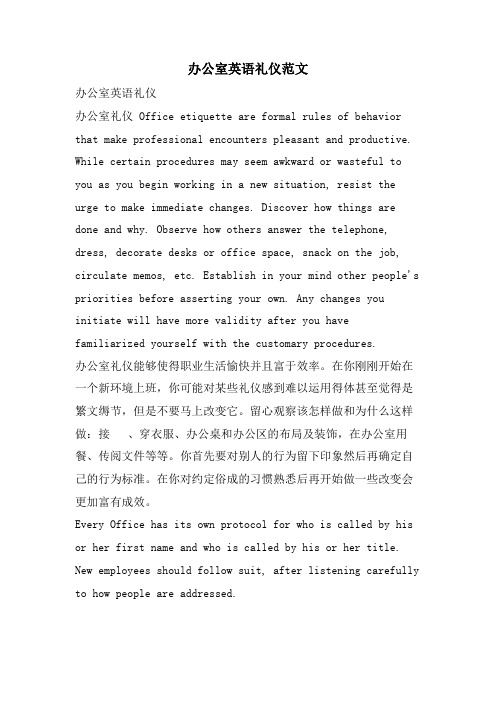
办公室英语礼仪范文办公室英语礼仪办公室礼仪 Office etiquette are formal rules of behavior that make professional encounters pleasant and productive. While certain procedures may seem awkward or wasteful to you as you begin working in a new situation, resist the urge to make immediate changes. Discover how things are done and why. Observe how others answer the telephone, dress, decorate desks or office space, snack on the job, circulate memos, etc. Establish in your mind other people's priorities before asserting your own. Any changes you initiate will have more validity after you havefamiliarized yourself with the customary procedures.办公室礼仪能够使得职业生活愉快并且富于效率。
在你刚刚开始在一个新环境上班,你可能对某些礼仪感到难以运用得体甚至觉得是繁文缛节,但是不要马上改变它。
留心观察该怎样做和为什么这样做:接、穿衣服、办公桌和办公区的布局及装饰,在办公室用餐、传阅文件等等。
你首先要对别人的行为留下印象然后再确定自己的行为标准。
在你对约定俗成的习惯熟悉后再开始做一些改变会更加富有成效。
Every Office has its own protocol for who is called by his or her first name and who is called by his or her title. New employees should follow suit, after listening carefully to how people are addressed.每个办公室对于称呼某人名字或者是称呼他/她的头衔都有固定的习惯。
办公室礼仪作文英语

办公室礼仪作文英语英文回答:Office etiquette is extremely important in maintaining a professional and respectful work environment. It involves a set of unwritten rules that govern behavior in the workplace, from how to dress appropriately to how to communicate effectively with colleagues.One key aspect of office etiquette is punctuality. Being on time for meetings, appointments, and deadlines shows respect for other people's time and demonstrates reliability. For example, I always make sure to arrive a few minutes early for meetings to show that I value my colleagues' time.Another important aspect of office etiquette is communication. It's essential to be polite and respectful when speaking to colleagues, whether in person or through email. Using appropriate language and tone can help avoidmisunderstandings and maintain a positive working relationship. For instance, I always try to use a friendly and professional tone in my emails to show that I value my colleagues' input.Furthermore, maintaining a clean and organized workspace is also part of office etiquette. Keeping my desk clutter-free and organized not only helps me stay focused and productive but also shows respect for my colleagues who may need to use my workspace. I make sure to tidy up my desk at the end of each day to create a welcoming environment for everyone.In addition, respecting personal boundaries is crucial in office etiquette. It's important to be mindful ofothers' privacy and space, whether it's respecting their personal belongings or refraining from gossiping about colleagues. I always make sure to respect my colleagues' privacy by not going through their personal belongings and by keeping confidential information confidential.Overall, practicing good office etiquette is essentialfor creating a harmonious and respectful work environment. By being punctual, communicating effectively, maintaining a clean workspace, and respecting personal boundaries, we can foster positive relationships with our colleagues and contribute to a productive work environment.中文回答:办公室礼仪在维护专业和尊重的工作环境方面非常重要。
办公室职场礼仪英语

办公室职场礼仪英语Whether you're the intern or the boss, learn how to be polite at work with basic office manners.无论你是实习生还是老板,你都需要知道根本的办公室礼仪,知道如何在工作中做到彬彬有礼。
1. Don't check personal devices during a meeting attended by your boss or anyone else who can make her disapproval your problem.不要在开会时查看自己的个人物品,特别是有老板或者任何可以对你说不的人参加的会议。
2. Don't pop up beside someone's cubicle, holding a conversation as a disembodied head.不要在其他人的格子间旁边突然现身,有话要同别人讲时,自己想象一个人在面前就可以了。
3. Don't use a speakerphone unless you're in your office and holding a meeting that's being attended by someone remotely. Alert the person you're speaking with that others are present, and close the door.不要用免提,除非你是在自己的办公室里,或者在开会时,其他与会者离你较远。
记得要提醒的另一头,有其他人在场。
最后记住要把门关上。
4. When answering the phone, state your name and place of business.打时,先报上自己的名字和单位。
Everyday Etiquette 办公室的日常礼仪
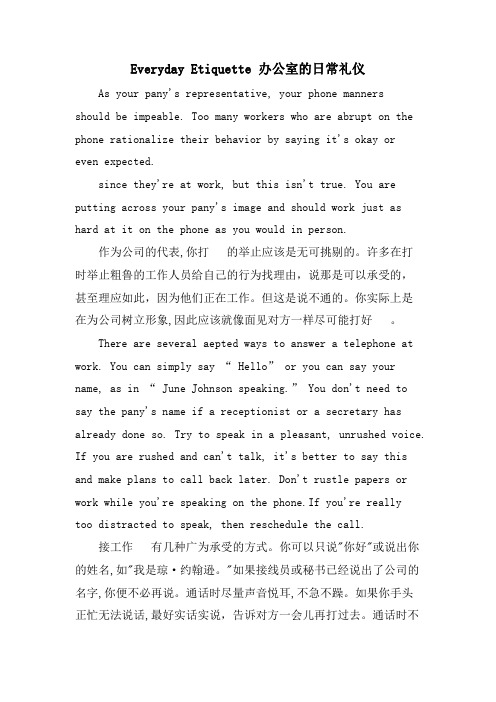
Everyday Etiquette 办公室的日常礼仪As your pany's representative, your phone mannersshould be impeable. Too many workers who are abrupt on the phone rationalize their behavior by saying it's okay oreven expected.since they're at work, but this isn't true. You are putting across your pany's image and should work just as hard at it on the phone as you would in person.作为公司的代表,你打的举止应该是无可挑剔的。
许多在打时举止粗鲁的工作人员给自己的行为找理由,说那是可以承受的,甚至理应如此,因为他们正在工作。
但这是说不通的。
你实际上是在为公司树立形象,因此应该就像面见对方一样尽可能打好。
There are several aepted ways to answer a telephone at work. You can simply say “ Hello” or you can say your name, as in “ June Johnson speaking.” You don't need to say the pany's name if a receptionist or a secretary has already done so. Try to speak in a pleasant, unrushed voice. If you are rushed and can't talk, it's better to say this and make plans to call back later. Don't rustle papers or work while you're speaking on the phone.If you're reallytoo distracted to speak, then reschedule the call.接工作有几种广为承受的方式。
办公室礼仪英语
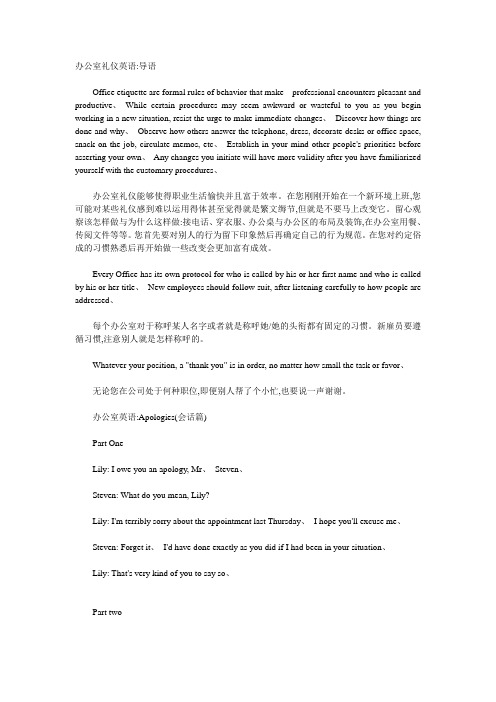
2、We're sorry the things we shipped to your place were damaged、
很抱歉,我们运往您处的货物遭到了损坏。
3、What a pity I left it at home、
真糟糕,我把它忘在家里了。
4、Please accept my deep apologies、
请接受我真诚的歉意。
5、I must ask your pardon for my carelessness、
请宽恕我的粗心。
6、I'm to blame、I should have thought of that、
都怪我,我应该想到这一点。
7、Actually I meant to notify you beforehand、
实际上我就是想事先通知您的。
8、I must have caused you a lot of inconvenience、
John: Yes, VIPs always are、So it's quite all right、And you're a very important person
at this party、
Eva: Oh, please don't!
John: I was just kidding、We've been expecting you all this time!
办公室英语:Apologies(会话篇)
Part One
Lily: I owe you an apology, Mr、Steven、
Steven: What do you mean, Lily?
办公室礼仪英语

办公室礼仪英语Office Etiquette in English: A Handy GuideIn the world of offices, it's like a littlemunity where everyone has their role to play. And when ites to English office etiquette, it's not just about speaking the language right, it's about fitting in and making the work environment pleasant for everyone.Let's start with greetings. When you walk into the office in the morning, a simple "Good morning" can set a positive tone for the day. It's like a warm ray of sunshine that brightens up the place. And don't mumble it under your breath like you're talking to yourself. Say it clearly and with a smile, if possible. You know how you feel when someone says hello to you in a friendly way? It just makes you feel wee. Well, that's what you're doing for others too. And if it's afternoon, "Good afternoon" does the trick. It's not that hard, is it?When ites tomunication in meetings, it's important to be respectful. You can't just barge in and start talking like you're the only one in the room. It's like being at a dinner party. You wait for your turn to speak. When you do speak, use proper English. No slang or jargon that not everyone will understand. It's like bringing a dish to a potluck that everyone can enjoy, not some strange concoction that only you like. And listen to others when they're talking. Don't just be thinking about what you're going to say next. Give them your full attention. It's the polite thing to do, just like you would if your friend was telling you an important story.Email etiquette is another big part of office life. The subject line should be clear, like a signpost that tells people what's inside the email. Don't write something super vague like "Hey" or "Stuff." Be specific, like "Meeting Agenda for Tuesday." And in the body of the email, start with a friendly greeting, just like you would in person. Keep your language professional but not overly stiff. It's not a letter to the Queen, but it's also not a text to your best buddy from high school. Use proper grammar and punctuation. A misspelled word or a missingma can make you look sloppy, like wearing wrinkled clothes to an important meeting. And end the email with a polite closing, like "Best regards" or "Sincerely."In the office, we also have to deal with colleagues from different cultures. English might be themon language, but cultural differences still play a role. For example, some cultures are more formal in theirmunication, while others are more laid - back. We have to be aware of this and adapt. It's like learning the rules of a new game. You don't want to break the rules without knowing them. If you're not sure how to interact with a colleague from a different culture, just be polite and respectful. It usually goes a long way.Another aspect is the use of office equipment. If you're using the shared printer, don't hog it all to yourself. It's like sharing a toy with your siblings. Let others have a turn. And if there's a problem with the equipment, don't just leave it for someone else to deal with. Try to fix it if you can, or at least report it. It's part of being a responsible member of the office "family."When ites to dress code, if the office has a formal dress code, follow it. You wouldn't show up to a black - tie event in your flip - flops, right? Dress appropriately for the work environment. It shows that you respect the office and your colleagues. And if it's a more casual office, don't take it as an excuse to look like you just rolled out of bed. Still look presentable.In conclusion, office etiquette in English is all aboutrespect,munication, and fitting in. It's not rocket science. By following these simple guidelines, you can make the office a more harmonious and productive place. So, just be polite,municate clearly, and be aware of your surroundings. That's all there is to it.。
正确办公室礼仪英语作文
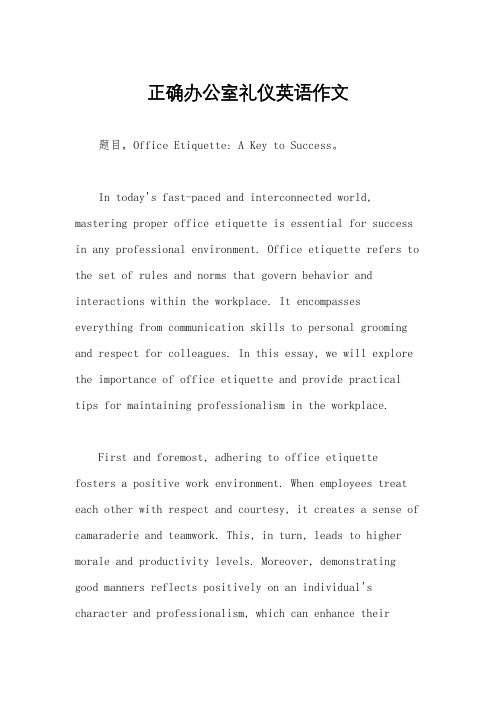
正确办公室礼仪英语作文题目,Office Etiquette: A Key to Success。
In today's fast-paced and interconnected world, mastering proper office etiquette is essential for success in any professional environment. Office etiquette refers to the set of rules and norms that govern behavior and interactions within the workplace. It encompasses everything from communication skills to personal grooming and respect for colleagues. In this essay, we will explore the importance of office etiquette and provide practical tips for maintaining professionalism in the workplace.First and foremost, adhering to office etiquettefosters a positive work environment. When employees treat each other with respect and courtesy, it creates a sense of camaraderie and teamwork. This, in turn, leads to higher morale and productivity levels. Moreover, demonstrating good manners reflects positively on an individual's character and professionalism, which can enhance theirreputation and career prospects.One of the fundamental aspects of office etiquette is communication. Effective communication is crucial for conveying ideas, resolving conflicts, and collaborating on projects. Whether it's face-to-face conversations, emails, or phone calls, it's important to communicate clearly, politely, and professionally. This means using appropriate language, active listening, and being mindful of cultural differences.Another key component of office etiquette is punctuality. Arriving to work and meetings on time demonstrates reliability and respect for other people's time. Chronic lateness can disrupt workflow and create tension among colleagues. By making punctuality a priority, individuals show that they are organized and committed to their responsibilities.Furthermore, maintaining a clean and tidy workspace is essential for promoting a professional image. A cluttered desk not only looks unprofessional but can also hinderproductivity. By keeping their workspace organized, employees can streamline their workflow and minimize distractions. Additionally, practicing good personal hygiene, such as grooming and dressing appropriately, contributes to a professional appearance and instills confidence in others.Respecting boundaries and maintaining confidentiality are also vital aspects of office etiquette. Employees should be mindful of sensitive information and refrain from gossiping or spreading rumors. Respecting colleagues' privacy and personal space helps to build trust and fosters a harmonious work environment.In addition to these general guidelines, there may be specific rules of etiquette that vary depending on the workplace culture and industry. For example, in some organizations, it may be customary to address superiors by their titles, while in others, using first names may be acceptable. It's important for employees to familiarize themselves with the norms and expectations of their particular workplace.In conclusion, mastering office etiquette is essential for success in today's professional world. By adhering to the principles of respect, communication, punctuality, and professionalism, individuals can foster a positive work environment, build strong relationships with colleagues, and enhance their career prospects. Ultimately, practicing good office etiquette is not only a sign of respect for others but also a reflection of one's own character and integrity.。
办公室礼仪小贴士英语作文

Office etiquette is a set of unwritten rules that govern how we interact with each other in a professional environment. Its not just about making a good impression its also about showing respect and courtesy to our colleagues and creating a harmonious workplace. Here are some tips Ive learned from my own experiences and observations that can help anyone navigate the office landscape with grace and professionalism.1. Punctuality: Being on time is a sign of respect for others time. It shows that you value the meeting or the person youre meeting with. Ive noticed that when I arrive early or on time, it sets a positive tone for the day and demonstrates my commitment to my work.2. Dress Appropriately: The way you dress can speak volumes about your professionalism. Ive learned to always dress according to the companys dress code, which not only shows respect for the workplace but also helps in maintaining a professional image.3. Communication: Clear and concise communication is key in an office setting. Whether its an email, a phone call, or a facetoface conversation, I make sure to articulate my thoughts clearly and respectfully. This has helped me avoid misunderstandings and build strong working relationships.4. Respect Personal Space: Everyone has their own personal bubble, and its important to respect that. Ive found that keeping a comfortable distance and not encroaching on someones personal space can go a long way in maintaining positive relationships.5. Noise Levels: Keeping noise levels down is crucial, especially in open office environments. I try to be mindful of my voice volume and the sounds I make, ensuring that Im not disturbing my colleagues.6. Cleanliness: A clean and organized workspace reflects on your professionalism. I make it a point to keep my desk tidy and dispose of any trash properly. This not only makes the office look better but also helps in maintaining a healthy work environment.7. Technology Etiquette: With the prevalence of technology in the workplace, its important to be mindful of how we use it. I avoid using my phone for personal calls during work hours and ensure that my social media usage doesnt interfere with my productivity.8. Confidentiality: Trust is a vital component of any professional relationship. Ive always made sure to keep sensitive information confidential and not to gossip about colleagues or clients.9. Offering Help: A little help can go a long way in building camaraderie. Whenever I see a colleague struggling with a task, I offer my assistance. This not only helps in building strong bonds but also contributes to a supportive work culture.10. Gratitude: Saying thank you when someone helps you or completes a task is a simple yet powerful way to show appreciation. I make it a habit to express my gratitude, which has helped me in fostering positiverelationships at work.11. Meetings Etiquette: When it comes to meetings, I always prepare beforehand, come with an agenda, and ensure that the discussions are focused and productive. This respect for others time and the purpose of the meeting has been wellreceived by my colleagues.12. Lunch Breaks: Respecting lunch breaks is important. I make sure to take my break without disturbing others and return on time, showing consideration for the time others need for their breaks as well.In conclusion, office etiquette is about creating an environment where everyone feels respected and valued. By following these simple yet effective tips, we can contribute to a more pleasant and productive workplace. Its not just about the rules its about the spirit of cooperation and respect that these etiquette tips embody.。
关于办公室礼仪英语口语对话范文
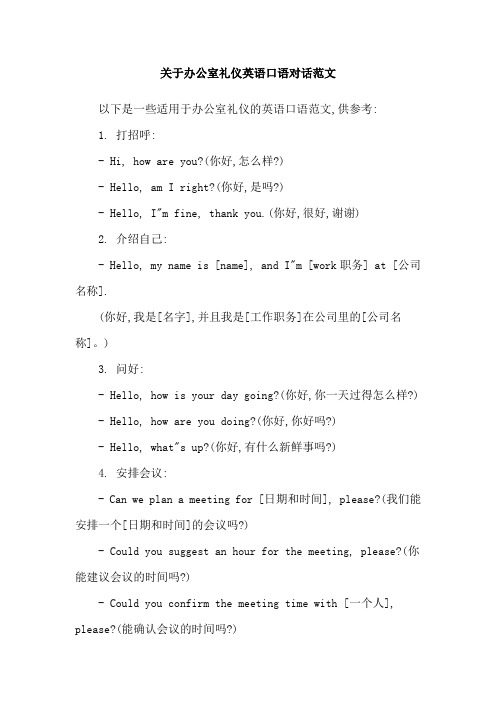
关于办公室礼仪英语口语对话范文以下是一些适用于办公室礼仪的英语口语范文,供参考:1. 打招呼:- Hi, how are you?(你好,怎么样?)- Hello, am I right?(你好,是吗?)- Hello, I"m fine, thank you.(你好,很好,谢谢)2. 介绍自己:- Hello, my name is [name], and I"m [work职务] at [公司名称].(你好,我是[名字],并且我是[工作职务]在公司里的[公司名称]。
)3. 问好:- Hello, how is your day going?(你好,你一天过得怎么样?) - Hello, how are you doing?(你好,你好吗?)- Hello, what"s up?(你好,有什么新鲜事吗?)4. 安排会议:- Can we plan a meeting for [日期和时间], please?(我们能安排一个[日期和时间]的会议吗?)- Could you suggest an hour for the meeting, please?(你能建议会议的时间吗?)- Could you confirm the meeting time with [一个人], please?(能确认会议的时间吗?)5. 接受礼物:- Thank you for your gift.(谢谢你的礼物)- You"re welcome.(不客气)6. 感谢:- Thank you for [帮助][帮助的内容].(感谢你[帮助][帮助的内容])- Thank you for your [服务][服务的内容].(感谢你[服务][服务的内容])7. 道别:- Have a nice day/night.(祝你度过愉快的一天/晚上。
)- Good luck, and I"ll see you next time.(祝你好运,下次见。
办公室礼仪英语范文

办公室礼仪英语范文Office Etiquette in EnglishIntroduction:Office etiquette refers to the set of rules and norms that govern professional behavior in the workplace. It includes manners, courtesy, professional conduct, and respect for others. Adhering to office etiquette is crucial for creating a positive work environment, promoting teamwork, and fostering productivity. This article will discuss various aspects of office etiquette in English.1. Dress Code:One aspect of office etiquette is the dress code. It is important to dress appropriately and professionally in the workplace. Men should wear business suits or dress pants with a shirt and tie. Women can wear business suits, skirts or dress pants with a blouse or a conservative dress. Avoid wearingcasual or revealing clothing, as it can be seen as unprofessional.2. Punctuality:3. Good Hygiene:Maintaining good personal hygiene is crucial in the office. This includes regular bathing, using deodorant, brushing teeth,and wearing clean clothes. Avoid excessive use of perfume or cologne, as it may bother colleagues with allergies or sensitivities.4. Telephone Etiquette:5. Email Etiquette:6. Respect for Colleagues:Showing respect for colleagues is a fundamental aspect of office etiquette. Treat everyone with courtesy and avoid gossiping or spreading rumors. Listen attentively to others during meetings and discussions. Avoid interrupting or talking over others. Be willing to collaborate and help colleagues when needed.7. Meeting Etiquette:8. Conflict Resolution:9. Use of Shared Spaces:Shared spaces such as conference rooms, break rooms, and restrooms require proper etiquette. Keep these areas clean and tidy. Respect other people's privacy in shared spaces. Avoid loitering or lingering in these spaces unnecessarily.Conclusion:Office etiquette plays a vital role in maintaining a professional and harmonious work environment. By adhering tothese guidelines, individuals can demonstrate professionalism, respect, and consideration towards colleagues. Implementing office etiquette in English will not only enhance personal reputation but also contribute to the overall success and productivity of the organization.。
办公室礼仪英语表达
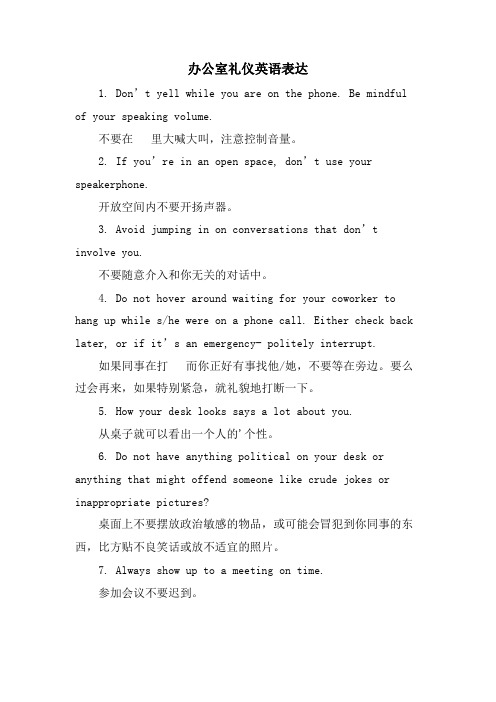
办公室礼仪英语表达1. Don’t yell while you are on the phone. Be mindful of your speaking volume.不要在里大喊大叫,注意控制音量。
2. If you’re in an open space, don’t use your speakerphone.开放空间内不要开扬声器。
3. Avoid jumping in on conversations that don’t involve you.不要随意介入和你无关的对话中。
4. Do not hover around waiting for your coworker to hang up while s/he were on a phone call. Either check back later, or if it’s an emergency- politely interrupt.如果同事在打而你正好有事找他/她,不要等在旁边。
要么过会再来,如果特别紧急,就礼貌地打断一下。
5. How your desk looks says a lot about you.从桌子就可以看出一个人的'个性。
6. Do not have anything political on your desk or anything that might offend someone like crude jokes or inappropriate pictures?桌面上不要摆放政治敏感的物品,或可能会冒犯到你同事的东西,比方贴不良笑话或放不适宜的照片。
7. Always show up to a meeting on time.参加会议不要迟到。
8. Do not bring your cell phone to a meeting. If you do have it- put the ringer on silent or airplane mode 开会时最好不要带上手机。
办公礼仪英语
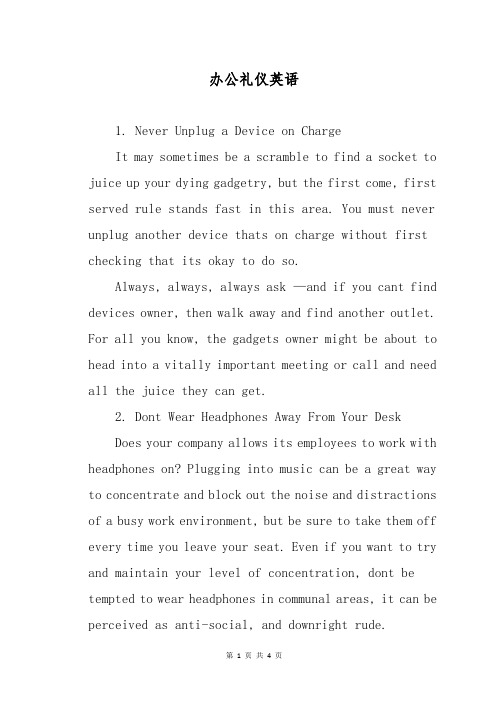
办公礼仪英语1. Never Unplug a Device on ChargeIt may sometimes be a scramble to find a socket to juice up your dying gadgetry, but the first come, first served rule stands fast in this area. You must never unplug another device thats on charge without first checking that its okay to do so.Always, always, always ask —and if you cant find devices owner, then walk away and find another outlet. For all you know, the gadgets owner might be about to head into a vitally important meeting or call and need all the juice they can get.2. Dont Wear Headphones Away From Your DeskDoes your company allows its employees to work with headphones on? Plugging into music can be a great way to concentrate and block out the noise and distractions of a busy work environment, but be sure to take them off every time you leave your seat. Even if you want to try and maintain your level of concentration, dont be tempted to wear headphones in communal areas, it can be perceived as anti-social, and downright rude.3. Dont Use Someone Elses ComputerIts easy to think all equipment is company property and fair game for use, but this does not e*tend to computers and laptops. You should never use someone elses PC, even if it is just for a super-quick fact check. Most people are pretty possessive about their PCs and view unauthorized use as an intrusion of their privacy.4. Dont Forget to Refill SuppliesBe a good neighbor when it comes to office equipment. If you use the last of the photocopier paper, refill it. Return gadgets fully charged. Put a new pot of coffee on if you have the last cup. Report inevitable printer errors to someone who can fi* the issue. Dont walk away from an issue, even if youre mega-busy and think no one noticed that you were the last person to use it.5. Put Your Phone on Silent at All TimesEven if its office policy to allow personal calls on your mobile phone, we strongly suggest switching your phone to silent every single time you enter the office. You may only get personal calls on occasion, but you can bet the times you do either someone important will be walking past or youll have left your phone unattendedat your desk while everyone else hears it ring. Also, your novelty alert tones might amuse you, but can seriously grate on the nerves of nearby colleagues. Dont be that person.6. Limit Laptop Activity in MeetingsWhile its commonplace to take your laptop into meetings, try and be disciplined about what you do with it. Although its tempting to carry on working, check mail, IM or even browse during meetings, you should limit this kind of activity out of politeness. If no one can see your screen, you may think that tapping away on the keyboard could be interpreted as taking notes, but it will be fairly obvious to anyone else present that your attention is away from the room.7. Dont Be an IM NuisanceInstant messaging is a really useful tool, but its easy to misuse and this can be a real source of annoyance. Wed hope it goes without saying to respect someones busy status, but there are other issues to consider too. Only inter-office IM someone with a query that can be resolved within a few brief responses. If the conversation is going to be longer than that, get up andspeak to them in person or pick up the phone.8. Dont Be a Screen SmearerFinally, this may seem like a small thing to pick up on, but we promise you its a huge source of annoyance for many. Dont be a screen smearer. Were obviously not talking about touch screens here, but monitors and laptop displays. Some people really dislike it when you put fingerprints on their screens. While its easy to do if youre trying to make a point or e*plain something, try not to touch other peoples screens and definitely dont touch any screen if youve got dirty fingers.。
重要的办公室礼仪英语作文
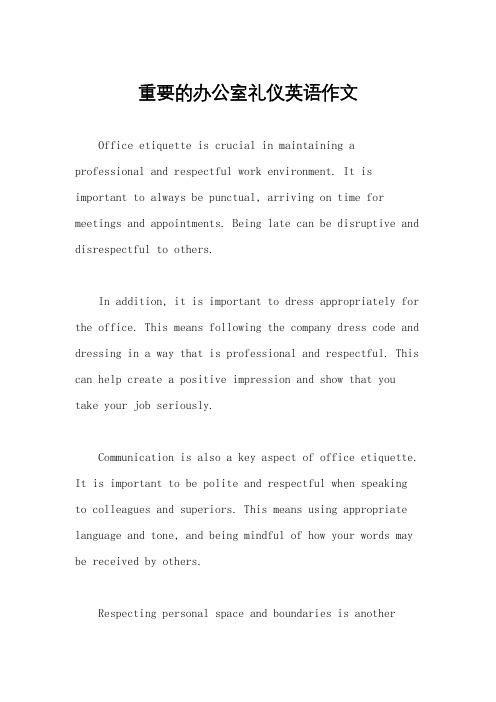
重要的办公室礼仪英语作文Office etiquette is crucial in maintaining a professional and respectful work environment. It is important to always be punctual, arriving on time for meetings and appointments. Being late can be disruptive and disrespectful to others.In addition, it is important to dress appropriately for the office. This means following the company dress code and dressing in a way that is professional and respectful. This can help create a positive impression and show that you take your job seriously.Communication is also a key aspect of office etiquette. It is important to be polite and respectful when speaking to colleagues and superiors. This means using appropriate language and tone, and being mindful of how your words may be received by others.Respecting personal space and boundaries is anotherimportant aspect of office etiquette. This means being mindful of others' workspaces and not intruding on their personal space without permission. It also means being respectful of others' time and not interrupting them when they are busy.Finally, it is important to be mindful of office cleanliness and organization. This means keeping your workspace tidy and organized, and being respectful of shared spaces such as the kitchen and bathroom. This can help create a positive and professional work environmentfor everyone.In conclusion, office etiquette is essential for maintaining a professional and respectful work environment. By following these guidelines, you can help create a positive and productive workplace for yourself and your colleagues.。
办公室的礼仪(中英对照)
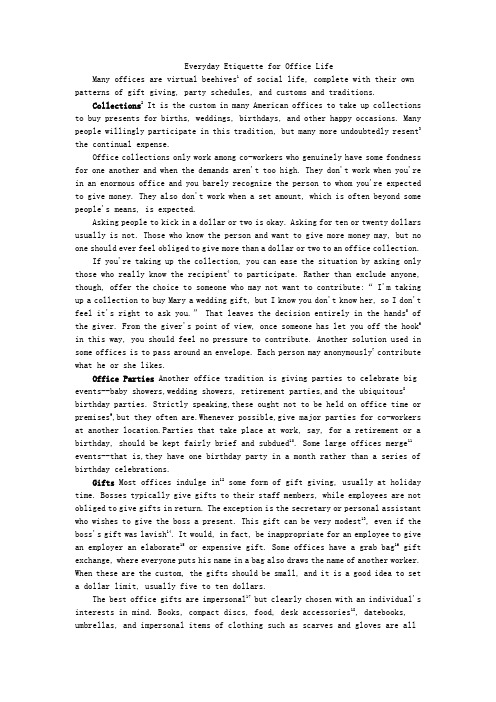
Everyday Etiquette for Office LifeMany offices are virtual beehives1 of social life, complete with their own patterns of gift giving, party schedules, and customs and traditions.Collections2 It is the custom in many American offices to take up collections to buy presents for births, weddings, birthdays, and other happy occasions. Many people willingly participate in this tradition, but many more undoubtedly resent3 the continual expense.Office collections only work among co-workers who genuinely have some fondness for one another and when the demands aren't too high. They don't work when you're in an enormous office and you barely recognize the person to whom you're expected to give money. They also don't work when a set amount, which is often beyond some people's means, is expected.Asking people to kick in a dollar or two is okay. Asking for ten or twenty dollars usually is not. Those who know the person and want to give more money may, but no one should ever feel obliged to give more than a dollar or two to an office collection.If you're taking up the collection, you can ease the situation by asking only those who really know the recipient4 to participate. Rather than exclude anyone, though, offer the choice to someone who may not want to contribut e:“ I'm taking up a collection to buy Mary a wedding gift, but I know you don't know her, so I don't feel it's right to ask you.” That leaves the decision entirely in the hands5 of the giver. From the giver's point of view, once someone has let you off the hook6 in this way, you should feel no pressure to contribute. Another solution used in some offices is to pass around an envelope. Each person may anonymously7contribute what he or she likes.Office Parties Another office tradition is giving parties to celebrate big events--baby showers,wedding showers, retirement parties,and the ubiquitous8 birthday parties. Strictly speaking,these ought not to be held on office time or premises9,but they often are.Whenever possible,give major parties for co-workers at another location.Parties that take place at work, say, for a retirement or a birthday, should be kept fairly brief and subdued10. Some large offices merge11 events--that is,they have one birthday party in a month rather than a series of birthday celebrations.Gifts Most offices indulge in12 some form of gift giving, usually at holiday time. Bosses typically give gifts to their staff members, while employees are not obliged to give gifts in return. The exception is the secretary or personal assistant who wishes to give the boss a present. This gift can be very modest13, even if the boss's gift was lavish14. It would, in fact, be inappropriate for an employee to give an employer an elaborate15 or expensive gift. Some offices have a grab bag16 gift exchange, where everyone puts his name in a bag also draws the name of another worker. When these are the custom, the gifts should be small, and it is a good idea to set a dollar limit, usually five to ten dollars.The best office gifts are impersonal17 but clearly chosen with an individual's interests in mind. Books, compact discs, food, desk accessories18, datebooks, umbrellas, and impersonal items of clothing such as scarves and gloves are allacceptable. Joke gifts are fine and popular in many offices as long as they are not overly offensive.Employers should also keep in mind that a bonus19 is not a present. It is part of the reimbursement20package and as such should never be referred to or considered a present. Apart from any specific office rituals, gift exchanges among co-workers are the same as gift exchanges among friends.办公室的日常礼仪许多办公室实际上是社交生活的热闹场所,有自己完备的赠送礼物、安排聚会以及习俗和传统的模式。
办公室基本礼仪英语作文
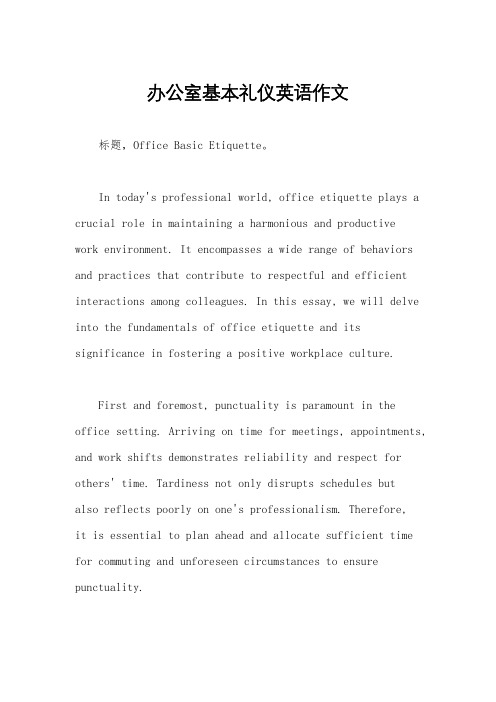
办公室基本礼仪英语作文标题,Office Basic Etiquette。
In today's professional world, office etiquette plays a crucial role in maintaining a harmonious and productivework environment. It encompasses a wide range of behaviors and practices that contribute to respectful and efficient interactions among colleagues. In this essay, we will delve into the fundamentals of office etiquette and its significance in fostering a positive workplace culture.First and foremost, punctuality is paramount in the office setting. Arriving on time for meetings, appointments, and work shifts demonstrates reliability and respect for others' time. Tardiness not only disrupts schedules butalso reflects poorly on one's professionalism. Therefore,it is essential to plan ahead and allocate sufficient time for commuting and unforeseen circumstances to ensure punctuality.Furthermore, communication etiquette is vital for effective collaboration and interpersonal relationships in the office. Clear and concise communication helps to avoid misunderstandings and promotes clarity in conveying ideas and instructions. Whether through face-to-face conversations, emails, or phone calls, it is crucial to maintain a professional tone and adhere to the principles of courtesy and respect. Active listening is equally important, as it demonstrates attentiveness and empathy towards colleagues' perspectives.Moreover, maintaining a tidy and organized workspace is a reflection of professionalism and attention to detail. A clutter-free environment not only enhances productivity but also fosters a sense of professionalism and pride in one's work. It is essential to keep desks, common areas, and meeting rooms neat and tidy, and to dispose of waste responsibly. By demonstrating respect for shared spaces, colleagues can work more efficiently and collaboratively.In addition to physical workspace etiquette, it is essential to be mindful of digital etiquette in today'stechnology-driven workplace. With the prevalence of email communication and instant messaging platforms, it iscrucial to use these tools responsibly and professionally. Avoiding excessive use of emojis or abbreviations, proofreading messages for clarity and accuracy, and respecting colleagues' time by avoiding unnecessary emailsor messages outside of working hours are all key aspects of digital etiquette.Another critical aspect of office etiquette is respecting diversity and inclusivity in the workplace. Treating all colleagues with fairness, dignity, and respect, regardless of their background, gender, ethnicity, or beliefs, contributes to a positive and inclusive work culture. Avoiding discriminatory language or behavior, actively listening to diverse perspectives, and fosteringan environment where everyone feels valued and heard are essential for building a cohesive and high-performing team.Furthermore, professionalism extends beyond individual interactions to include respect for company policies and protocols. Adhering to dress codes, confidentialityagreements, and other organizational guidelines demonstrates a commitment to upholding the values and standards of the workplace. Additionally, demonstrating integrity and honesty in all professional dealings builds trust and credibility among colleagues and supervisors.In conclusion, office etiquette is a cornerstone of professional conduct in the modern workplace. By adhering to principles of punctuality, communication, organization, digital etiquette, diversity and inclusivity, and professionalism, colleagues can cultivate a positive and respectful work environment conducive to productivity and collaboration. By embracing these principles, individuals contribute to a culture of mutual respect, trust, and success in the workplace.。
办公礼仪常识英语作文
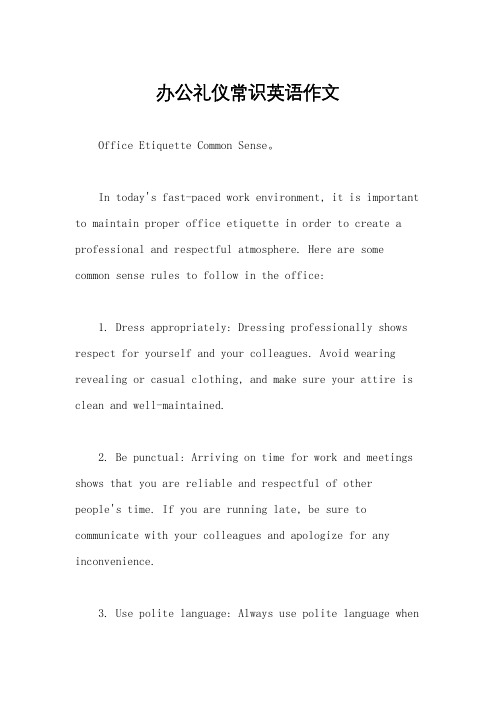
办公礼仪常识英语作文Office Etiquette Common Sense。
In today's fast-paced work environment, it is important to maintain proper office etiquette in order to create a professional and respectful atmosphere. Here are some common sense rules to follow in the office:1. Dress appropriately: Dressing professionally shows respect for yourself and your colleagues. Avoid wearing revealing or casual clothing, and make sure your attire is clean and well-maintained.2. Be punctual: Arriving on time for work and meetings shows that you are reliable and respectful of otherpeople's time. If you are running late, be sure to communicate with your colleagues and apologize for any inconvenience.3. Use polite language: Always use polite language whenspeaking to your colleagues, supervisors, and clients. Avoid using offensive or inappropriate language, and be mindful of your tone of voice.4. Respect personal space: Be mindful of personal space and avoid invading someone's personal space without permission. Knock before entering someone's office or cubicle, and respect their privacy.5. Practice good hygiene: Maintaining good personal hygiene is essential in the office. Be sure to shower regularly, brush your teeth, and wear clean clothes. Avoid wearing strong perfumes or colognes that may bother your colleagues.6. Use technology responsibly: When using technology in the office, be sure to use it responsibly. Avoid using your personal devices for non-work-related activities, and be mindful of your online behavior.7. Follow office policies: Familiarize yourself with your company's policies and procedures, and follow themaccordingly. This includes policies on attendance, dress code, and use of company resources.8. Be respectful of others: Treat your colleagues with respect and kindness, regardless of their position in the company. Avoid gossiping or spreading rumors, and be supportive of your colleagues.By following these common sense rules, you can create a positive and professional work environment that fosters respect and collaboration. Remember, good office etiquette is essential for success in the workplace.。
办公区十项准则(中英文翻译)
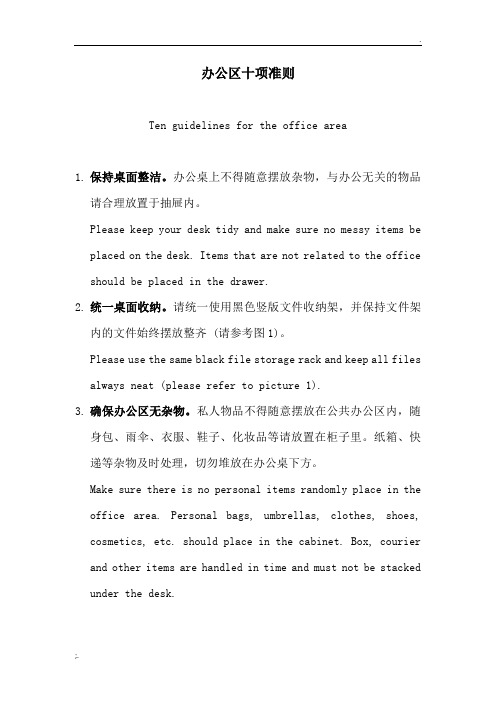
办公区十项准则Ten guidelines for the office area1.保持桌面整洁。
办公桌上不得随意摆放杂物,与办公无关的物品请合理放置于抽屉内。
Please keep your desk tidy and make sure no messy items be placed on the desk. Items that are not related to the office should be placed in the drawer.2.统一桌面收纳。
请统一使用黑色竖版文件收纳架,并保持文件架内的文件始终摆放整齐 (请参考图1)。
Please use the same black file storage rack and keep all files always neat (please refer to picture 1).3.确保办公区无杂物。
私人物品不得随意摆放在公共办公区内,随身包、雨伞、衣服、鞋子、化妆品等请放置在柜子里。
纸箱、快递等杂物及时处理,切勿堆放在办公桌下方。
Make sure there is no personal items randomly place in the office area. Personal bags, umbrellas, clothes, shoes, cosmetics, etc. should place in the cabinet. Box, courier and other items are handled in time and must not be stacked under the desk.4.注意维护办公区卫生。
公共办公区内不得进食、乱扔垃圾等现象出现。
Pay attention to maintaining the health of the office area.No eating or littering in public office areas.5.强化职业形象。
- 1、下载文档前请自行甄别文档内容的完整性,平台不提供额外的编辑、内容补充、找答案等附加服务。
- 2、"仅部分预览"的文档,不可在线预览部分如存在完整性等问题,可反馈申请退款(可完整预览的文档不适用该条件!)。
- 3、如文档侵犯您的权益,请联系客服反馈,我们会尽快为您处理(人工客服工作时间:9:00-18:30)。
9. Everyday Etiquette fo Office LifeMost bosses expect their employees to get along with one another and,more important, to get along with clients and customers.This means that however important your job skills are,they may not count for much if you don't also have some people skills. Fortunately,getting along with people usually boils down to simple, everyday courtesy.大多数雇主期望他们的员工能够和睦相处,更重要的是,与客户和顾客相处好。
这就意味着不管你的工作技能有多么重要,如果你没有一些人际交往的技能,你的工作技能便会大打折扣。
好在与人相处通常就落实在简单易行的日常礼仪上。
Representing Your EmployerWhen you work for a company, you are its representative to the outside world. For this reason, everyone from a secretary to a CEO should know how to greet visitors and make them feel comfortable.代表你的雇主当你供职于一家公司时,你便是其对外界的代表。
基于此,从秘书到总经理,每位员工都应该知道如何接待来访者并让他们感到舒适自在。
Both men and women should stand to greet visitors who come into their office. Coworkers also should be given a warm greeting, but you need not rise each time one comes into your office. For a visitor, though, your hand should be extended just as it would be if you were the host in your own home. Ask the person to sit down; and if there is a choice of seats, you may want to wave him into one.员工不管是男是女,当有来访者走进他们的办公室时都应起身相迎。
同事之间也应打个热情的招呼,但你无需在有人进入你办公室时每次都起身致意。
但是对于一个来访者,你应该伸出自己的手去欢迎客人,正如同在自家你身为主人那样。
要请来访者坐下;如果有几把椅子,你应该挥手示意他落坐其中的一把。
Many managers and executives sit behind their desks when talking to co-workers and customers, but it is more gracious to move a conversation out to a sofa or two occasional chairs. Visitors should be asked whether they would like a beverage1. If the answer is yes, the manager should get the drink or ask a secretary or assistant to get it.许多管理人员和行政人员与同事或客户说话时坐在自己的办公桌后面,但如果将交谈地点移出,移至一张沙发上或两把椅子之间,会更为得体。
应该问问来访者想不想喝点什么。
如果回答是肯定的,经理应该自己去拿饮料或让秘书或助手去拿。
Office GreetingsAlthough corporate cultures vary from business to business and even from region to region, the exchange of daily greetings is a ritual2 everywhere. Co-workers usually say hello first thing in the morning and then simply smile when they pass each other the rest of the day. No further verbal greeting is called for, and no one should take offense3 when a colleague doesn't stop to chat. It is considered rude, though, not to acknowledge fellow workers when you see them, even if it is for the fifteenth time in one day. You can nod or smile, but don't look the other way when you see someone.Office Chitchat4Beyond routine5 greetings, how much people chitchat during the day generally depends on the atmosphere of the work environment. A formal, rigidly6 organized workplace may allow little room for casual conversation, while one that is informal and loosely organized leaves room for this kind of socializing. Sometimes talk is encouraged or discouraged by the nature of the work. An assembly line that involves heavy equipment or noise, for example, doesn't promote collegial7 chitchat, while an underworked sales staff may spend most of its work day talking.In many workplaces, the chitchat--especially that of extracurricular8 nature--is frowned on by management, and with good reason, since workers do have jobs to perform. Then the problem for an employee who wants to appear friendly is how to disengage from9 the friendly chatter without alienating10 co-workers.When you must cut short a conversation to get to work, it helps to announce your reason in a friendly manner. For example, you might say,“ I'd love to talk more, butI've got to finish the year-end budget report,”or, “Can't talk right now. I have to finish these estimates.”If you disengage graciously, there should be no problem except for those relatively few workers who don't get the message. In these cases a little less friendliness is called for. Don't smile broadly; don't stop to initiate a conversation. When a talker walks by, quickly say,“ Hi there,” but don't look up from your work expectantly11. With time, they should get the message.办公室的日常礼仪〔一〕大多数雇主期望他们的员工能够和睦相处,更重要的是,与客户和顾客相处好。
这就意味着不管你的工作技能有多么重要,如果你没有一些人际交往的技能,你的工作技能便会大打折扣。
好在与人相处通常就落实在简单易行的日常礼仪上。
代表你的雇主当你供职于一家公司时,你便是其对外界的代表。
基于此,从秘书到总经理,每位员工都应该知道如何接待来访者并让他们感到舒适自在。
员工不管是男是女,当有来访者走进他们的办公室时都应起身相迎。
同事之间也应打个热情的招呼,但你无需在有人进入你办公室时每次都起身致意。
但是对于一个来访者,你应该伸出自己的手去欢迎客人,正如同在自家你身为主人那样。
要请来访者坐下;如果有几把椅子,你应该挥手示意他落坐其中的一把。
许多管理人员和行政人员与同事或客户说话时坐在自己的办公桌后面,但如果将交谈地点移出,移至一张沙发上或两把椅子之间,会更为得体。
应该问问来访者想不想喝点什么。
如果回答是肯定的,经理应该自己去拿饮料或让秘书或助手去拿。
办公室寒暄尽管企业文化在各行各业甚至各个地区有所不同,但每天互打招呼不管在哪里都是一种礼仪。
同事间早晨见面通常说声“你好”,在其后的一天里见面时只微笑示意即可。
